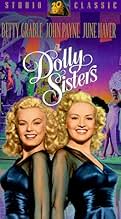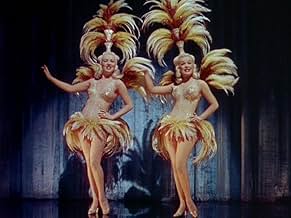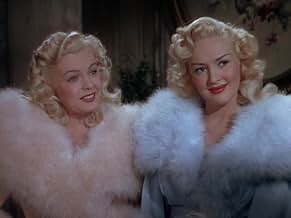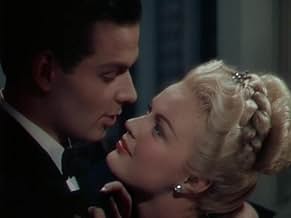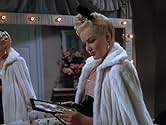IMDb-BEWERTUNG
6,2/10
883
IHRE BEWERTUNG
Füge eine Handlung in deiner Sprache hinzuTwo sisters from Hungary become famous entertainers in the early 1900s. Fictionalized biography with lots of songs.Two sisters from Hungary become famous entertainers in the early 1900s. Fictionalized biography with lots of songs.Two sisters from Hungary become famous entertainers in the early 1900s. Fictionalized biography with lots of songs.
- Regie
- Drehbuch
- Hauptbesetzung
- Für 1 Oscar nominiert
- 1 Nominierung insgesamt
Fred Aldrich
- Soldier
- (Nicht genannt)
Lester Allen
- Morrie Keno
- (Nicht genannt)
Herbert Ashley
- Fields
- (Nicht genannt)
Nino Bellini
- French Actor
- (Nicht genannt)
Brooks Benedict
- Party Guest
- (Nicht genannt)
Trude Berliner
- German Actress
- (Nicht genannt)
Edward Biby
- Party Guest
- (Nicht genannt)
Lulu Mae Bohrman
- Party Guest
- (Nicht genannt)
Eddie Borden
- Man on Bus
- (Nicht genannt)
Empfohlene Bewertungen
The real-life Dolly sisters were brunettes but that didn't stop Fox from pairing Bette Grable and June Haver as the famous duo, in addition to fictionalizing their rise to fame in vaudeville and the legit circuit. Nevertheless, this is a typical 1940s charmer of a musical, with the talented John Payne for added appeal and good performances by S. Z. Sakall and Reginald Gardiner. Grable and Haver are seen in a good number of singing and dancing routines and there is even one new song ("I Can't Begin To Tell You") supposedly penned by John Payne. It's all very likeable technicolored entertainment in lavish style. Betty's role is a little more dramatic than usual and she does a good piece of emoting in the final scenes. If you're a Grable fan, you can't afford to miss this one! And she was never better than when she was teamed opposite John Payne--good chemistry and believable sparks.
Betty Grable and June Haver are "The Dolly Sisters" in this 1945 film also starring John Payne, S.Z. Sakall and Reginald Gardner. Grable enjoyed an unparalleled run - 10 years in a row - in the Hollywood top ten box office, from 1941 to 1951, yet when Turner Classic Movies published their Unforgettable Leading Ladies of the Studio Era book, Grable was left out. For anyone who believes - erroneously - that Turner Classic Movies has any interest in film history, she was left out - just as Tyrone Power was left out of the leading men book - because TCM doesn't own their films.
Not realizing that for a huge audience later on, it wouldn't exist, 20th Century Fox spared no expense for this lavish color musical about two real-life Hungarian sisters (actually brunettes) who were big entertainers in the beginning of the century. The story focuses on Jenny Dolly (Grable) primarily and her romance and marriage to Ziegfeld performer Harry Fox (inventor of the "fox trot"), played by John Payne, and how World War I and career separations destroyed their marriage.
Grable and Haver look just like sisters and are marvelous together, wearing gorgeous costumes and looking fabulous and radiant throughout. Both bring a lot of energy to their roles. Payne does a good job as Harry, singing and acting well. A versatile actor, he could not only appear in musicals where he did his own singing, but he did plenty of drama and was also a hunk. He was invaluable to Fox during the war years.
This is a very entertaining film, but it's a shame that a film on the true story of the Dolly Sisters has never been made. Jenny and Fox were divorced in 1921. She was indeed involved in a car accident with an ex-boyfriend in 1933 and had to sell her jewels to pay for many surgeries, but unlike the film, she never really recovered. She never reconciled with Fox and in 1941, she hung herself. Rosie did marry a Chicago businessman; she attempted suicide in 1962, though it failed, and she died in 1970. The two women were huge gamblers, only hinted at in the film, and made a fortune: They won $850,000 in one season at Deauville and one evening in Cannes, Jenny won 4 million francs, which she converted to a collection of jewelry, and then went on to win another 11 million more francs.
I suppose during World War II, no one would have been interested in such a downer, so it's just as well that we have this film, which gives us vibrant entertainment in the best 20th Century Fox tradition.
Not realizing that for a huge audience later on, it wouldn't exist, 20th Century Fox spared no expense for this lavish color musical about two real-life Hungarian sisters (actually brunettes) who were big entertainers in the beginning of the century. The story focuses on Jenny Dolly (Grable) primarily and her romance and marriage to Ziegfeld performer Harry Fox (inventor of the "fox trot"), played by John Payne, and how World War I and career separations destroyed their marriage.
Grable and Haver look just like sisters and are marvelous together, wearing gorgeous costumes and looking fabulous and radiant throughout. Both bring a lot of energy to their roles. Payne does a good job as Harry, singing and acting well. A versatile actor, he could not only appear in musicals where he did his own singing, but he did plenty of drama and was also a hunk. He was invaluable to Fox during the war years.
This is a very entertaining film, but it's a shame that a film on the true story of the Dolly Sisters has never been made. Jenny and Fox were divorced in 1921. She was indeed involved in a car accident with an ex-boyfriend in 1933 and had to sell her jewels to pay for many surgeries, but unlike the film, she never really recovered. She never reconciled with Fox and in 1941, she hung herself. Rosie did marry a Chicago businessman; she attempted suicide in 1962, though it failed, and she died in 1970. The two women were huge gamblers, only hinted at in the film, and made a fortune: They won $850,000 in one season at Deauville and one evening in Cannes, Jenny won 4 million francs, which she converted to a collection of jewelry, and then went on to win another 11 million more francs.
I suppose during World War II, no one would have been interested in such a downer, so it's just as well that we have this film, which gives us vibrant entertainment in the best 20th Century Fox tradition.
The real Dolly Sisters were dark, in both complexion and hair, Hungarian dancers with complex personalities and troubled lives, in fact Jenny had committed suicide several years before the debut of this musical, so if you are looking for anything resembling a depiction of the actual Dolly Sisters story look elsewhere. However if a sumptuous overstuffed showcase for blonds Betty Grable and June Haver is what you seek this is for you. Filmed in almost blinding Technicolor with some good songs and one great and beautiful one, I'm Always Chasing Rainbows, eye popping costumes and hairstyles this is old fashioned entertainment dished up with style.
Betty Grable was considered quite the hot number in her day-a favorite pin-up girl of American soldiers. I always thought she had a crabby look on her face. Be that as it may, this is one of her biggest hits, probably her most lavish musical, made at the peak of her career. An up-and-coming June Haver also stars. Although it has some basis in the lives of the real Dolly sisters, the film makes no effort to be biographical. It traces the rise and heartbreak of the sisters as they conquer vaudeville, Broadway, and Europe singing tunes like "Carolina in the Morning," "Give Me the Moonlight, Give Me the Girl (and leave the rest to Me)," "I'm Always Chasing Rainbows," and the newer tune "I Can't Begin To Tell You," which was a Hit Parade favorite. If you watch a copy that hasn't been cut, the outrageous production numbers are considered the height of kitsch today, "monuments to bad taste" they have been called, that must be seen to be believed. "Darktown Strutters Ball" features Grable and Haver in with bronzed faces, singing in mutilated French, and cavorting around a Harlem set as pig-tailed 'picaninnies' surrounded by deeply tanned chorus girls in hats made of watermelons, dice, and playing cards. At least the girls are made up to look gorgeous and not foolish. It's quite a spectacle. ---from Musicals on the Silver Screen, American Library Association, 2013
This colorful musical directed with great style by Irving Cummings is a delightful way to spend some happy moments. This 1945 Fox film presents the life of two sisters that became a sensation in America at the beginning of the last century. The music is the best excuse to watch this happy movie.
We first meet the young Dolly Sisters, Jenny and Rose, as they arrive in America from their native Hungary. The girls are talented and soon, they are delighting the vaudeville circuit with their charm and talent. Their career soared after Harry Fox, who later became Jenny's husband, introduces them to the great Oscar Hammerstein, who sees in the women, an amazing capacity to entertain the public of the era.
As played by Betty Grable and June Haver, the Dolly Sisters are irresistible! The real sisters were not blond, but who could fault the stars with the disarming way they act in the musical? Ms. Grable and Ms. Haver are a sight for sore eyes!
As the man in Jennie's life, John Payne plays Harry Fox convincingly. Mr. Payne projects a virile figure and he is perfect opposite the gorgeous Betty Grable. His composition in the movie, "I'm Always Chasing Rainbow" was written by Harry Carroll and Joseph McCarthy whose inspiration is the Chopin's Fantasy and Impromptu in C Minor and it blends perfectly in the composition and in the subtext of the film. There are also appearances by that charming character actor, S. Z. Sakall, who plays the girl's uncle. Also Reginald Gardiner does good work as the Duke of Breck.
This is a fine musical that will delight fans of the genre.
We first meet the young Dolly Sisters, Jenny and Rose, as they arrive in America from their native Hungary. The girls are talented and soon, they are delighting the vaudeville circuit with their charm and talent. Their career soared after Harry Fox, who later became Jenny's husband, introduces them to the great Oscar Hammerstein, who sees in the women, an amazing capacity to entertain the public of the era.
As played by Betty Grable and June Haver, the Dolly Sisters are irresistible! The real sisters were not blond, but who could fault the stars with the disarming way they act in the musical? Ms. Grable and Ms. Haver are a sight for sore eyes!
As the man in Jennie's life, John Payne plays Harry Fox convincingly. Mr. Payne projects a virile figure and he is perfect opposite the gorgeous Betty Grable. His composition in the movie, "I'm Always Chasing Rainbow" was written by Harry Carroll and Joseph McCarthy whose inspiration is the Chopin's Fantasy and Impromptu in C Minor and it blends perfectly in the composition and in the subtext of the film. There are also appearances by that charming character actor, S. Z. Sakall, who plays the girl's uncle. Also Reginald Gardiner does good work as the Duke of Breck.
This is a fine musical that will delight fans of the genre.
Wusstest du schon
- WissenswertesIn one of the early songs, the lyrics mention the foxtrot. This dance was named after Harry Fox, a Vaudeville star credited with inventing the dance.
- VerbindungenFeatured in Gotta Dance, Gotta Sing (1982)
Top-Auswahl
Melde dich zum Bewerten an und greife auf die Watchlist für personalisierte Empfehlungen zu.
- How long is The Dolly Sisters?Powered by Alexa
Details
- Erscheinungsdatum
- Herkunftsland
- Sprache
- Auch bekannt als
- The Dolly Sisters
- Drehorte
- Produktionsfirma
- Weitere beteiligte Unternehmen bei IMDbPro anzeigen
Box Office
- Budget
- 2.510.000 $ (geschätzt)
- Laufzeit1 Stunde 54 Minuten
- Seitenverhältnis
- 1.37 : 1
Zu dieser Seite beitragen
Bearbeitung vorschlagen oder fehlenden Inhalt hinzufügen


